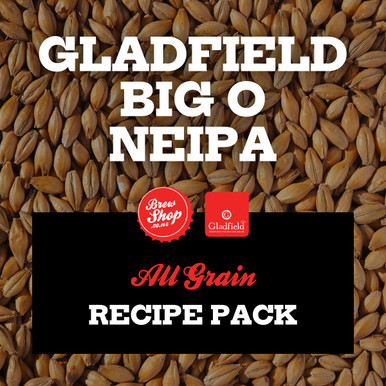brewed and bottled with Axel
yeast foam overflowed the fermenter on day 2 / 3
swapped out the bubbler and monitored, settled down after another day
to prevent
- more headspace in fermenter
- cooler ferment to slow down reactions
- less yeast (?)
- larger jug-based bubble to catch any overflow and maintain the one way valve
used 24L for mash in
13L for sparge
https://www.gladfieldmalt.co.nz/brewing-recipes/gladfield-big-o-neipa-hazy
- Heat Strike Water to achieve Mash Temp of 69°C (~6°C above strike).
- Add minerals to Strike or Foundation water.
- Begin mashing in. Measure the mash pH (once all the grain is added) to achieve 5.2-5.5 (adjust with 1 mL additions of 88% lactic acid, if required).
- Mash at 69°C for 60 mins. Confirm no residual starches remain.
- Batch sparge with 78°C water until kettle volume is achieved (or stop runoff when the last runnings drop below 1.010 and pH rises above 5.75).
- Boil for 90 minutes adding hops (remember: add no kettle finings) at indicated times.
- At End Of Boil, whirlpool while chilling (immersion style) or for 10 mins, stand 15 mins or until chilled to pitching temperature.
- Transfer to fermenter at 18-20°C, oxygenating wort (inline or via aeration in fermenter).
- Rehydrate and pitch yeast as per manufacturer’s recommendations. Ferment at 1°C for the first 3-4 days.
- Begin dry hopping on day 1. Aim to add the final dry hop addition at 4-6 SG points (1-1.5Po) from the predicted Final Gravity. Once added, cap the fermentation (spunding valves are great for this), raise the fermentation set point to 22°C for at least 48hrs to diacetyl rest.
- Crash the beer to ~0-1°C until yeast load has reduced. Do not filter or fine this style.
Note: To confirm the haze is not solely due to yeast, take a sample and stand it in a glass in the fridge for 30 mins to check for sediment. If one forms there is still yeast in solution = leave it to condition longer.
- Once you’re happy with the haze level, rack the beer into a keg. Force carbonate and/or bottle condition to 2.45-2.55 volumes CO2.

